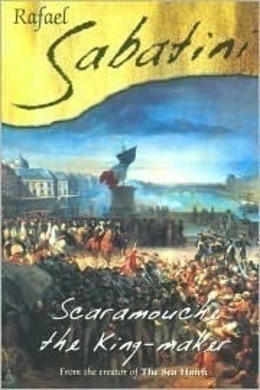
-
EPUB 446 KB
-
Kindle 575 KB
-
Support epubBooks by making a small $2.99 PayPal donation purchase.
This work is available for countries where copyright is Life+70 or less.
Description
Another adventure from Sabatini’s remarkable and much-loved hero. In Scaramouche the Kingmaker, Andre Louis again dons his famous and much-admired disguise to embark upon a new adventure - and one full of the thrill and swashbuckling action that has earnt Sabatini his place in the hall of great writers.
536 pages with a reading time of ~8.25 hours (134160 words), and first published in 1931. This DRM-Free edition published by epubBooks, 2014.
Community Reviews
There are currently no other reviews for this book.
Excerpt
It was suspected of him by many that he had no heart.
Repeatedly he allows this suspicion to be perceived in the course of those confessions of his upon which I drew so freely for the story of the first part of his odd life. In the beginning of that story we see him turning his back, at the dictates of affection, upon an assured career in the service of Privilege. At the end of it we see him forsaking the cause of the people in which he had prospered and, again at the dictates of affection, abandoning the great position won.
Of the man who twice within the first twenty-eight years of his life, deliberately, in the service of others, destroys his chances of success, it is foolish to say that he has no heart. But it was the whim of André-Louis Moreau to foster this illusion. His imagination had early been touched by the teaching of Epictetus, and deliberately he sought to assume the characteristics of a Stoic: one who would never permit his reason to be clouded by sentiment, or his head to be governed by his heart.
He was, of course, by temperament an actor. It was as Scaramouche, and as author, player and organizer of the Binet Troupe that he had found his true vocation. Persisting in it his genius might have won him a renown greater than the combined renowns of Beaumarchais and Talma. Desisting from it, however, he had carried his histrionic temperament into such walks of life as he thereafter trod, taking the world for his stage.
Such temperaments are common enough, and commonly they are merely tiresome.
André-Louis Moreau, however, succeeds in winning our interest by the unexpectedness of what he somewhere frankly and fantastically calls his exteriorizations. His gift of laughter is responsible for this. The comic muse is ever at his elbow, though not always obvious. She remained with him to the end, although in this, the second part of his history, his indulgence of the old humour is fraught with a certain bitterness in a measure as the conviction is borne in upon him that in the madness of the world there is more evil than was perceived even by those philosophers who have sought to teach it sanity.
His flight from Paris at a moment when, as a man of State, a great career was opening before him, was a sacrifice dictated by the desire to procure the safety of those he loved: Aline de Kercadiou, whom he hoped to marry Monsieur de Kercadiou, his godfather and Madame de Plougastel, whose natural son it had been so lately discovered to him that he was. That flight was effected without adventure. Every barrier was removed by the passport carried by the Representative André-Louis Moreau, which announced that he travelled on the business of the National Assembly, commanded all to lend him such assistance as he might require, and warned all that they hindered him at their peril.
The berline conveying them travelled by way of Rheims but continuing eastward it began to find the roads increasingly encumbered by troops, gun-carriages, service-wagons and commissariat trains and all the unending impedimenta of an army on the march.
So as to make progress, they were constrained to turn north, towards Charleville, and thence east again, crossing the lines of the National Army, still commanded by Luckner and La Fayette, which awaited the enemy who for over a month now had been massing on the banks of the Rhine.
It was this definite movement of invasion which had driven the populace of France to frenzy. The storming of the Tuileries by the mob, and the horrors of the 10th of August gave the answer of the populace to the pompous minatory ill-judged manifesto bearing the signature of the Duke of Brunswick, but whose real authors were Count Fersen and the rash Queen. By its intemperate menaces this manifesto contributed more perhaps than any other cause to the ruin of the King whom it was framed to save for the Duke of Brunswick’s threats to the people of France made the King appear in the guise of a public danger.
This, however, was not the point of view of Monsieur de Kercadiou, Lord of Gavrillac, travelling under the revolutionary aegis of his godson to safety beyond the Rhine. In the uncompromising expressions of the Duke, Quentin de Kercadiou heard the voice of the man who is master of the situation, who promises no more than it is within his power to perform. What resistance could those raw, ill-clad, ill-nourished, ill-equipped, ill-trained, ill-armed troops through whose straggling lines they had passed, offer to the magnificent army of seventy thousand Prussians and fifty thousand Austrians, fortified by twenty-five thousand French émigrés, including the very flower of French chivalry?
